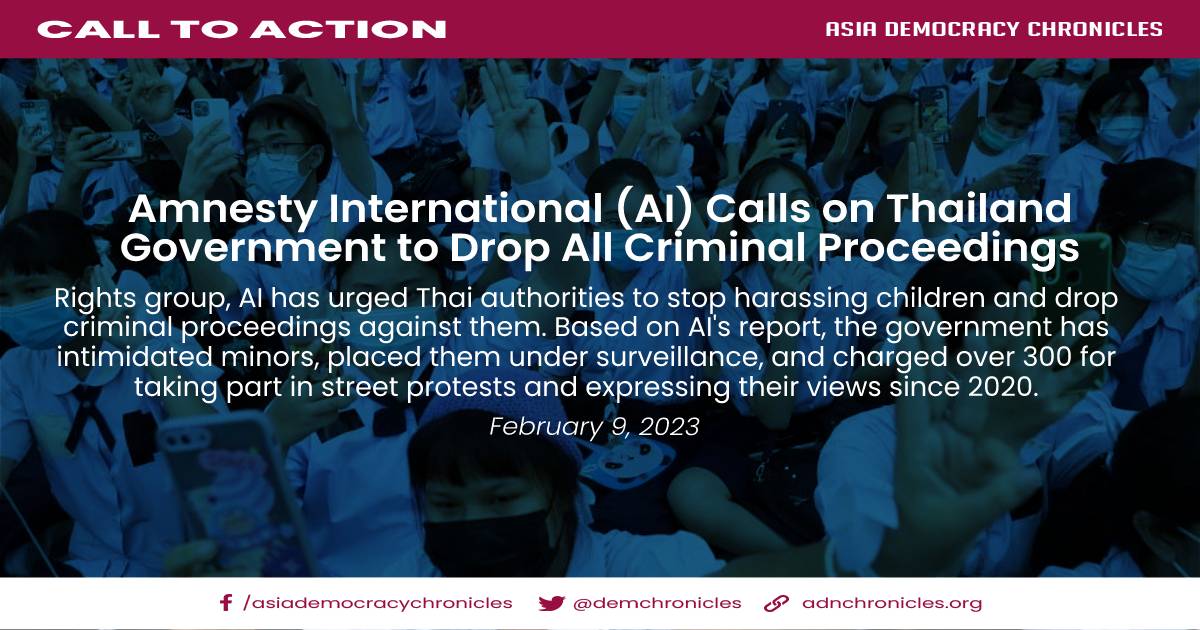|
Getting your Trinity Audio player ready...
|
9 February 2023
BANGKOK – The Thai authorities have intimidated minors and placed them under surveillance, and have charged nearly 300 of them over taking part in street protests or expressing their views since 2020, according to a report by human rights group Amnesty International released on Wednesday.
While the majority were accused of violating a decree imposed ostensibly as part of Covid-19-related measures, at least three were charged with sedition.
Notably, 17 were charged with lese majeste, the first time minors have been targeted with this law, which carries a jail sentence of up to 15 years.
The first minor sentenced for lese majeste was Thanakorn Phiraban, who was 17 when he made a public speech calling for monarchy reform in 2022. He was found guilty of two counts of royal defamation last November and December, respectively, and eventually made to enter a probation programme.
The report comes three years after the first mass youth-led demonstrations against Prime Minister Prayut Chan-o-cha’s government. The protests crested amid public dissatisfaction with the government’s handling of the pandemic.
Secondary school students who took to the streets spoke out on issues like marriage equality, indigenous rights, school regulations and monarchy reform.
While the protests were largely peaceful, some resulted in violent clashes between police and demonstrators.
During one confrontation in August 2021 outside Din Daeng police station in Bangkok, three teenage protesters were shot with live ammunition, allegedly by members of the public.
One of them, 15-year-old Warit Somnoi, was paralysed and eventually died from his injuries in October that year.
The 30 young activists interviewed by Amnesty International for its report revealed how the authorities pressured parents to stop their children from protesting, which sometimes led to domestic violence.
Chompoo (not her real name), a Bangkok teenager, told the organisation that three to four people who identified themselves as police officers have been regularly going to her home and monitoring her from nearby since she started her activism in March 2022 at the age of 13.
This made her feel “unsafe and anxious”, she said.
Another teenage activist, who called himself Posh, noticed a man following him in May 2022 – when he was 16 – after he joined a labour rights protest. The man followed Posh home and took photographs of him along the way.
Posh said he was subsequently followed by plain-clothes and uniformed officers, some of whom waited for him at school and asked his neighbours to provide information about him.
This has caused him to suffer from insomnia and panic attacks.
Local legal aid group Thai Lawyers for Human Rights found that at least 59 pro-democracy child protesters were subjected to tactics that amounted to harassment between January 2021 and November 2022.
Thai police spokesman Atchayon Kraithong declined to comment when contacted by The Straits Times, saying he needed to read the Amnesty International report in detail.
The rights group urged the Thai authorities to drop criminal proceedings against children and stop harassing them.
Its Thailand researcher Chanatip Tatiyakaroonwong said: “Children with their whole lives ahead of them now face severe repercussions merely for participating in peaceful protests.”



















